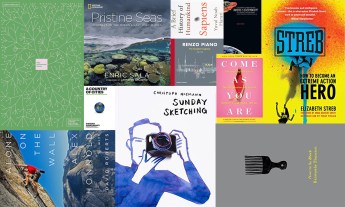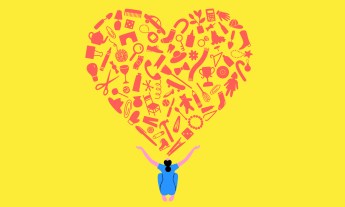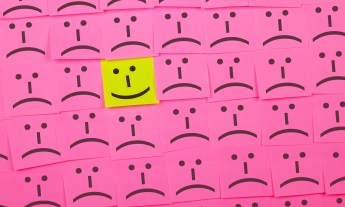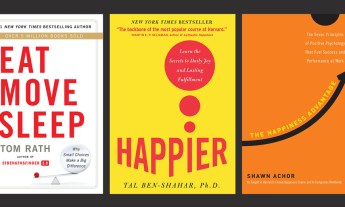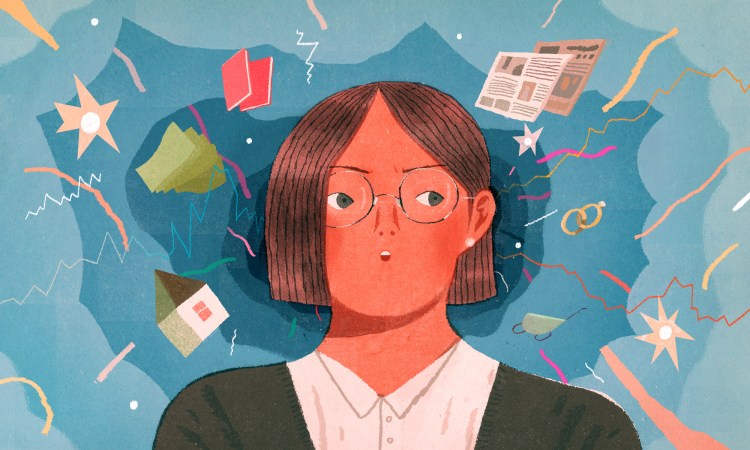
Anxiety could be the price that we have to pay for freedom, suggests psychologist Steven Pinker.
When it comes to happiness, many people are underachievers. Americans are laggards among their first-world peers, and their happiness has stagnated in the era sometimes called the American Century. The Baby Boomers, despite growing up in peace and prosperity, have proved to be a troubled generation, to the mystification of their parents, who lived through the Great Depression, World War II and — for many of my peers — the Holocaust. American women have become unhappier just as they have been making unprecedented gains in income, education, accomplishment and autonomy, and in other developed countries where everyone has gotten happier, the women have been outpaced by the men. None of us are as happy as we ought to be, given how amazing our world has become.
For some commentators, these happiness shortfalls have become an occasion to second-guess modernity. Our unhappiness, they say, is payback for our worship of the individual and material wealth and for our acquiescence in the corrosion of family, tradition, religion and community.
Those who are nostalgic for traditional folkways have forgotten how hard our forebears fought to escape them.
But there is a different way to understand the legacy of modernity. Those who are nostalgic for traditional folkways have forgotten how hard our forebears fought to escape them. Though no one gave happiness questionnaires to the people who lived in the close-knit communities that were loosened by modernity, much of the great art composed during the transition brought to life their dark side: the provincialism, conformity, tribalism and Taliban-like restrictions on women’s autonomy.
Many novels from the mid-18th to the early 20th century played out the struggles of individuals to overcome the suffocating norms of aristocratic, bourgeois or rural regimes. These include works by Samuel Richardson, William Thackeray, Charlotte Brontë, George Eliot, Theodor Fontane, Gustave Flaubert, Leo Tolstoy, Henrik Ibsen, Louisa May Alcott, Thomas Hardy, Anton Chekhov and Sinclair Lewis. After urbanized Western society had become more tolerant and cosmopolitan, the tensions were played out again in popular culture’s treatment of small-town American life, such as in songs by Paul Simon (“In my little town I never meant nothin’ / I was just my father’s son”), Lou Reed and John Cale (“When you’re growing up in a small town / You know you’ll grow down in a small town”) and Bruce Springsteen (“Baby, this town rips the bones from your back / It’s a death trap, a suicide rap”). It was played out yet again in the literature of immigrants, including works by Isaac Bashevis Singer, Philip Roth and Bernard Malamud and then by Amy Tan, Maxine Hong Kingston, Jhumpa Lahiri, Bharati Mukherjee and Chitra Banerjee Divakaruni.
Today we enjoy a world of personal freedom these characters could only fantasize about, a world in which people can marry, work and live as they please. One can imagine a social critic of today warning Anna Karenina or Nora Helmer that a tolerant cosmopolitan society isn’t all it’s cracked up to be, that without the bonds of family and village they’ll have moments of anxiety and unhappiness. I can’t speak for them, but my guess is they’d think it was a pretty good deal.
As people become better educated and increasingly skeptical of authority, they may feel unmoored in a morally indifferent cosmos.
A modicum of anxiety may be the price we pay for the uncertainty of freedom. It is another word for the vigilance, deliberation and heart-searching that freedom demands. It’s not entirely surprising that as women gained in autonomy relative to men, they also slipped in happiness. In earlier times, women’s list of responsibilities rarely extended beyond the domestic sphere. Young women increasingly say that their life goals include career, family, marriage, money, recreation, friendship, experience, correcting social inequities, being a leader in their community, and making a contribution to society. That’s a lot of things to worry about, and a lot of ways to be frustrated: Woman plans and God laughs.
It’s not just the options opened up by personal autonomy that place a weight on the modern mind; it’s also the great questions of existence. As people become better educated and increasingly skeptical of received authority, they may become unsatisfied with traditional religious verities and feel unmoored in a morally indifferent cosmos. People have also lost their comforting faith in the goodness of their institutions. The historian William O’Neill titled his history of the Baby Boomers’ childhood years American High: The Years of Confidence, 1945–1960. In that era, everything seemed great. Belching smokestacks were a sign of prosperity. America had a mission to spread democracy around the world. The atom bomb was proof of Yankee ingenuity. Women enjoyed domestic bliss, and Negroes knew their place. Though much about America was indeed good during those years — the economic growth rate was high; rates of crime and other social pathologies were low — today we see it as a fool’s paradise.
It may not be a coincidence that two of the sectors that underperform in happiness — Americans and Baby Boomers — were the sectors that were most set up for disillusionment in the 1960s. In retrospect, we can see that a concern with the environment, nuclear war, American foreign-policy blunders and racial and gender equality could not be put off forever. Even if they make us more anxious, we are better for being aware of them.
As we become aware of our collective responsibilities, each of us may add a portion of the world’s burdens to our own worry list. I suspect that many therapists today are listening to patients sharing their fears about terrorism, income inequality and climate change. A bit of anxiety is not a bad thing if it motivates people to support policies that would help solve major problems.
In earlier decades, people might have offloaded their worries to a higher authority, and some still do. In 2000, sixty religious leaders endorsed the Cornwall Declaration on Environmental Stewardship, which addressed the “so-called climate crisis” and other environmental problems by affirming that “God in His mercy has not abandoned sinful people or the created order but has acted throughout history to restore men and women to fellowship with Him and through their stewardship to enhance the beauty and fertility of the earth.” I imagine that they and the other 1,500 signatories do not visit therapists to air anxieties about the future of the planet. But as George Bernard Shaw observed, “The fact that a believer is happier than a skeptic is no more to the point than the fact that a drunken man is happier than a sober one.” Though some amount of anxiety will inevitably attend the contemplation of our political and existential conundrums, it need not drive us to pathology or despair.
Not every problem is a crisis or a panic, and among the things happening is that people solve the problems confronting them.
One of the challenges of modernity is how to grapple with a growing portfolio of responsibilities without worrying ourselves to death. As with all new challenges, we are groping toward the right mixture of old-fashioned and novel stratagems, including human contact, art, meditation, cognitive behavioral therapy, mindfulness, small pleasures, judicious use of pharmaceuticals, reinvigorated service and social organizations, and advice from wise people on how to lead a balanced life.
The media and commentariat, for their part, could reflect on their own role in keeping the country’s anxiety at a boil. Not every problem is a crisis, a plague, a panic or an epidemic, and among the things that happen in the world is that people solve the problems confronting them. And speaking of panics, what do you think are the greatest threats to the human species? In the 1960s, several thinkers advised that they were overpopulation, nuclear war and boredom. One scientist warned that although the first two might be survivable, the third definitely was not.
Boredom, really? You see, as people no longer have to work all day and think about where their next meal is coming from, they will be at a loss as to how to fill their waking hours, and will be vulnerable to debauchery, insanity, suicide, and the sway of religious and political fanatics. Fifty years later, it seems to me that we have solved the boredom crisis (or was it an epidemic?) and are instead experiencing the (apocryphal) Chinese curse of living in interesting times.
But don’t take my word for it. Since 1973, the General Social Survey has asked Americans whether they find life “exciting,” “routine,” or “dull.” Over the decades in which fewer Americans said they were “very happy,” more of them said that “life is exciting.” The divergence of the two is not a paradox. People who feel they lead meaningful lives are more susceptible to stress, struggle and worry. Consider as well that anxiety has always been a perquisite of adulthood: it rises steeply from the school-age years to the early twenties as people take on adult responsibilities, and then falls steadily over the rest of life’s course as they learn to cope with them.
Perhaps that is emblematic of the challenges of modernity. Though people today are happier, they are not as happy as one might expect, perhaps because they have an adult’s appreciation of life, with all its worry and all its excitement. The original definition of Enlightenment, after all, was “humankind’s emergence from its self-incurred immaturity.”
Excerpted with permission from the new book Enlightenment Now: The Case for Reason, Science, Humanism, and Progress by Steven Pinker. Published by Viking, an imprint and division of Penguin Random House LLC, New York. Copyright © 2018 by Steven Pinker.








